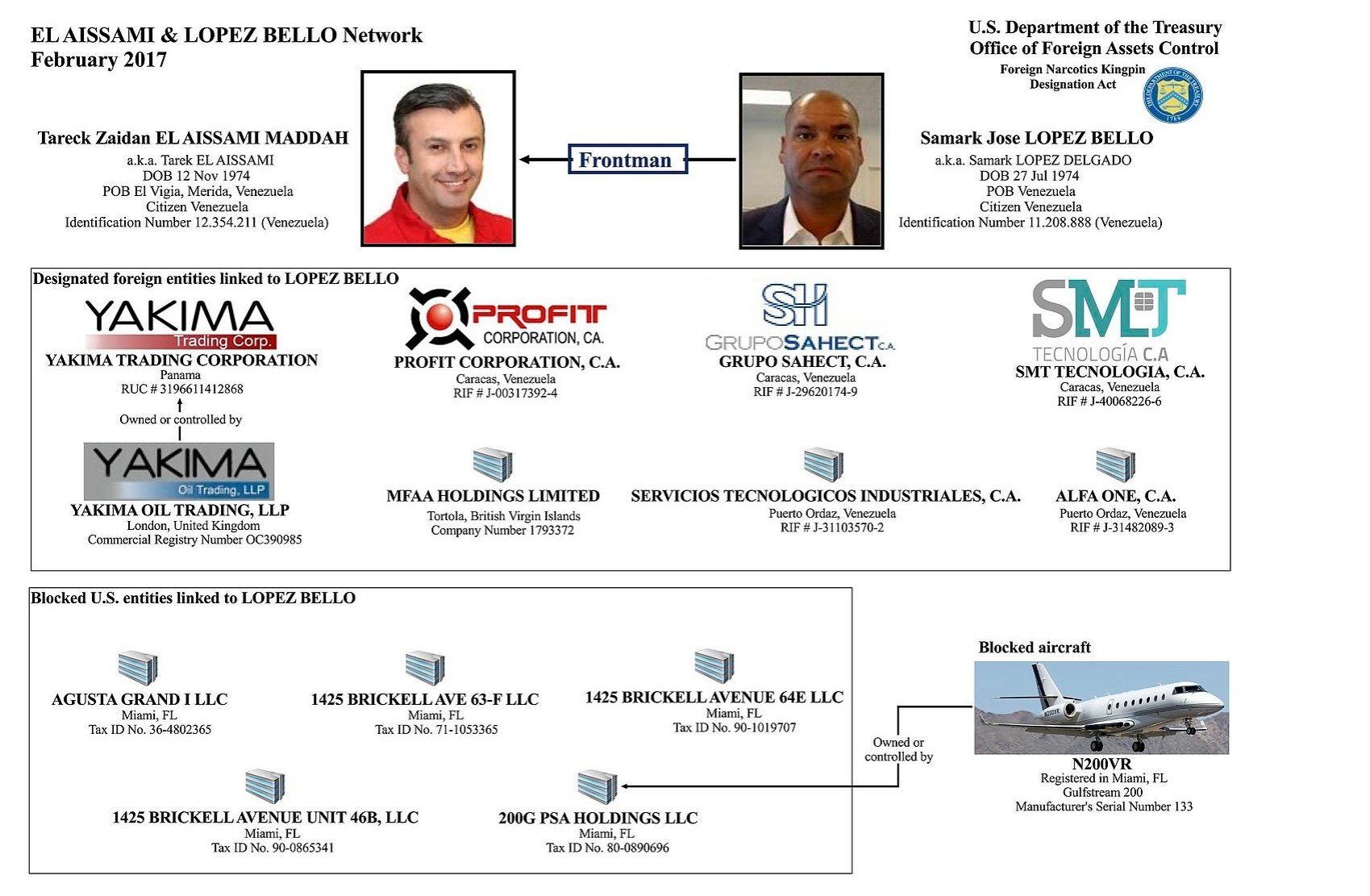WASHINGTON (CN) — A D.C. Circuit panel on Tuesday rejected a request by a Venezuelan billionaire and member of President Nicolás Maduro’s inner circle to reverse his designation as a drug trafficker.
The Office of Foreign Assets Control put Samark Jose Lopez Bello on its narcotics traffickers list in 2017, along with former Venezuelan Vice President Tareck El Aissami. Lopez Bello is a fugitive on the Immigration and Customs Enforcement’s most-wanted list with a $5 million reward.
Lopez Bello, through his attorney Erich Ferrari, challenged his designation, arguing that the government exceeded its authority by placing him on the traffickers list at the same time as El Aissami, depriving him of fair notice and failing to provide him proper remedies. El Aissami was designated a “Tier 1 trafficker,” while Lopez Bello received a Tier 2 designation.
In a news release announcing the original listing, the Treasury Department identified Lopez Bello as a “key frontman” for El Aissami who organized transcontinental cocaine shipments, laundered drug proceeds, purchased Venezuelan news outlets and handled business arrangements on El Aissami’s behalf.
The three-judge panel, made up of Chief U.S. Circuit Judge Sri Srinivasan, Senior Judge A. Raymond Randolph and Circuit Judge Karen Henderson, rejected all three points of his argument.
Lopez Bello argued that the simultaneous designation deprived him of fair notice that his conduct could lead to sanctions, because his supposed acts occurred before El Aissami’s designation — and therefore before he knew he was assisting a Tier 1 trafficker.
Henderson, a George H.W. Bush appointee, wrote in the court’s opinion that accepting Lopez Bello’s argument would go directly against the purpose of the Foreign Narcotics Kingpin Designation Act, which created the traffickers list.
“Although Lopez Bello asserts that OFAC must designate a Tier 1 trafficker first and then identify anyone assisting, supporting or acting on behalf of the designated trafficker, this interpretation hamstrings the Kingpin Act’s stated purpose of bankrupting and disrupting narcotics traffickers by allowing not-yet-designated Tier 2 traffickers to drain assets after a Tier 1 trafficker designation occurs,” Henderson wrote.
In a footnote, Henderson cited D.C. Circuit precedent that allows the government to sanction certain foundations based on evidence linking them to a terrorist group, even before that terrorist designation was determined. In Lopez Bello’s case, the government could base his designation on assistance provided before El Aissami was declared a trafficker.
If Lopez Bello showed relevant evidence he had severed ties with El Aissami, Henderson wrote, he could then request that his name be removed.
Henderson also noted that the government has a strong interest in providing short notice before placing someone on the traffickers list to prevent someone from hiding or liquidating their assets.
While Lopez Bello argued that simultaneous designation was unconstitutional, Henderson explained that prior case law has held “due process is flexible” when the government must act quickly.
The designation froze all of Lopez Bello’s assets in the U.S., including five holding companies registered in the country, making them subject to seizure.
Lopez Bello’s fortune derives from an international network of petroleum, distribution, engineering, telecommunications and asset holding companies. He has refused to return to the United States to face trial.
In his challenge, Lopez Bello said he was not given enough information about his listing to understand and offer rebuttal arguments. But the panel found that the government had done more than it was required by providing him an unclassified summary of their investigation and administrative record.
This was not Lopez Bello’s first trip before an American appeals court. He argued, via Ferrari, before the Eleventh Circuit in April 2022 to reverse a Florida judge’s determination that he must pay $53 million to the victims of a Colombian terrorist kidnapping.
Four surviving witnesses from the kidnapping brought the suit against the Revolutionary Armed Forces of Colombia, or FARC. They testified that Lopez Bello had ties to the group and was a member of the Cartel of the Suns, which traffics cocaine manufactured and produced by the armed group.
The appeals court ultimately ruled against Lopez Bello.
Subscribe to Closing Arguments
Sign up for new weekly newsletter Closing Arguments to get the latest about ongoing trials, major litigation and hot cases and rulings in courthouses around the U.S. and the world.









